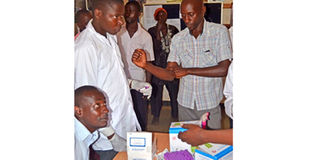Leaders accuse government of neglect as Hepatitis B claims more lives

Prevention. Some Nakaseke District staff test for Hepatitis B at the district headquarters in Butalangu Town Council on October 30 last year. PHOTO BY DAN WANDERA
What you need to know:
- Hepatitis B is prevalent in northern Uganda, with the Health ministry estimating that 30 per cent of the population in that region could be infected with Hepatitis B virus.
- Lira and Dokolo are the worst hit districts in Lango Sub-region.
NAKASEKE. Local leaders in Nakaseke District have accused the Ministry of Health of neglecting them as their people continue dieing of Hepatitis B.
In the last two years, Hepatitis B has claimed more than 10 lives in the district, with the latest cases recorded in Kapeeka Sub-county.
In the most recent case, a 32-year-old resident of Kyetume Village succumbed to the viral disease on October 8, just two weeks after being discharged from Nakaseke Hospital where he had been receiving treatment.
Frustrated
“We are disappointed that government has not responded to our repeated reminders on the need for quick intervention. We have tried to sensitise and tell our people to go for vaccination at the gazetted health facilities but the cost of the vaccine is still very high for ordinary residents,” Mr Ignatius Kiwanuka Koomu, the district chairperson, told Daily Monitor in an interview on Monday.
He added: “We have seen government intervening and providing vaccines for Hepatitis B in other districts and we believe Nakaseke should benefit from that emergence package too.”
Last year, the district authorities directed all its employees and the district councillors to undergo a compulsory test for Hepatitis B after a staff at the district headquaters died of the disease 2017.
All the district staff paid a minimum of Shs40,000 for a full immunisation dosage for Hepatitis B.
Hepatitis B is a viral infection that attacks the liver and can cause both acute and chronic disease. The virus is transmitted through contact with the blood or other body fluids of an infected person.
According to Nakaseke South MP Paul Lutamaguzi, many of his constituents in Kapeeka and Semuto sub-counties have been diagnosed with Hepatitis B but government has not yet intervened.
“We cannot know the exact number of people infected. It is the responsibility of government to handle some of these serious health risks,” Mr Lutamaguzi said.
Mr Johnson Kamuhangire, the district councillor for people with disabilities, said if nothing is done about the situation, they will mobilise residents to protest and express their disillusion with what they termed as government’s indifference about their plight.
The State minister for Health in-charge of General Duties, Dr Sarah Opendi, in a telephone interview with Daily Monitor at the weekend, explained that government, through her ministry, has so far made emergency interventions to contain the spread of the deadly disease, particularly in northern districts, Karamoja region, Teso sub-region, Busoga sub-region, Bukedi and two districts in central Uganda.
The minister was quick to reveal that Nakaseke District was not among the selected districts.
“We have had a financial challenge which could not allow the roll out of the vaccination programme in all districts. We expect to consider other districts, including Nakaseke next year (2019/20). We are also advocating for preventive measures while at the same time advising people who can access the vaccines at the accredited health facilities, especially the hospitals, to get the vaccines,” Ms Opendi said.
Hepatitis B
Prevalence. Hepatitis B is prevalent in northern Uganda, with the Health ministry estimating that 30 per cent of the population in that region could be infected with Hepatitis B virus.
A number of people aspiring to be recruited in the Local Defence Unit (LDU) have in the recent past been disqualified majorly because they have been found to be Hepatitis B positive.
Lira and Dokolo are the worst hit districts in Lango Sub-region.



